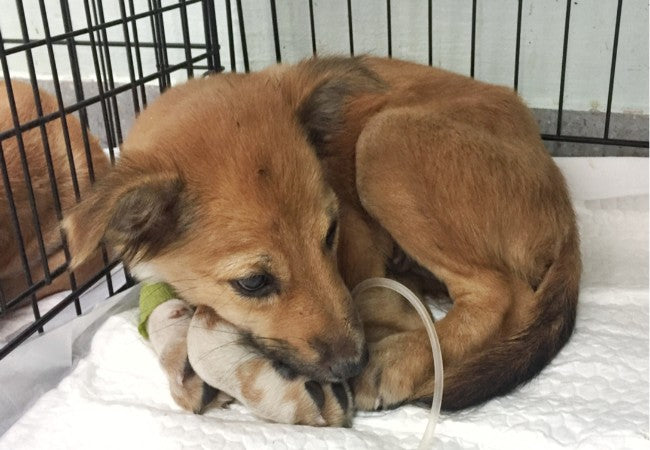Canine Herpesvirus (CHV) in Dogs: A 2025 Vet-Approved Guide to Symptoms, Diagnosis & Prevention🐶🦠

In this article
Canine Herpesvirus (CHV) in Dogs: A 2025 Vet-Approved Guide to Symptoms, Diagnosis & Prevention🐶🦠
By Dr. Duncan Houston BVSc
Canine herpesvirus (CHV), also known as Canid alphaherpesvirus 1, is a significant viral infection in dogs, particularly affecting puppies and breeding females. While adult dogs often show mild or no symptoms, CHV can be fatal in newborn puppies and cause reproductive issues in breeding dogs. Understanding CHV is crucial for breeders and pet owners to ensure the health and safety of their canine companions.
🧬 What is Canine Herpesvirus?
CHV is a member of the Herpesviridae family, specific to canines, including domestic dogs, wolves, and coyotes. The virus primarily affects the reproductive and respiratory systems and can establish lifelong latency in infected dogs, reactivating during periods of stress or immunosuppression.
⚠️ Transmission and Risk Factors
CHV is highly contagious among dogs and can be transmitted through:
- Direct contact: With infected bodily fluids such as saliva, nasal secretions, or genital secretions.
- Sexual contact: During mating.
- Transplacental transmission: From an infected mother to her puppies during pregnancy.
- Contact with contaminated objects, Such as food bowls, bedding, or grooming tools.
Puppies under three weeks old are at the highest risk, as their immature immune systems and inability to regulate body temperature make them more susceptible to severe infection.
🩺 Symptoms of CHV Infection
In Puppies:
- Failure to nurse or gain weight
- Persistent crying and restlessness
- Low body temperature (hypothermia)
- Soft, yellow-green feces
- Nasal discharge and difficulty breathing
- Hemorrhages on the abdomen, gums, or eyes
- Sudden death within 24–48 hours
In Adult Dogs:
- Mild respiratory symptoms (coughing, sneezing)
- Genital lesions or inflammation
- Infertility or spontaneous abortion in pregnant females
- Occasional conjunctivitis or eye infections
It's important to note that adult dogs may carry the virus without showing any clinical signs, posing a risk to puppies and other dogs.
🔬 Diagnosis of Canine Herpesvirus
Diagnosing CHV can be challenging due to its nonspecific symptoms and the possibility of latent infections. Diagnostic methods include:
- Polymerase Chain Reaction (PCR) testing: Detects viral DNA in tissue samples or bodily fluids.
- Serological tests: Identify antibodies against CHV, indicating exposure.
- Histopathology: Examination of tissue samples from deceased puppies to identify characteristic lesions.
Early and accurate diagnosis is essential for managing outbreaks, especially in breeding facilities.
💊 Treatment and Management
There is no specific antiviral treatment for CHV. Management focuses on supportive care and preventive measures:
- Supportive care for puppies: Maintaining a warm environment (above 95°F or 35°C) to inhibit viral replication, ensuring adequate nutrition and hydration.
- Isolation: Separating infected dogs from healthy ones to prevent the spread of the virus.
- Hygiene: Regular cleaning and disinfection of the environment and equipment.
- Monitoring: Close observation of pregnant females and newborn puppies for any signs of infection.
In some cases, administration of immune serum from recovered dogs has been attempted, but its efficacy remains uncertain.
🛡️ Prevention Strategies
Preventing CHV infection is crucial, particularly in breeding environments:
- Isolation of pregnant females: From three weeks before to three weeks after whelping to minimize exposure.
- Regular veterinary check-ups: For breeding dogs, to monitor health and detect any signs of infection.
- Vaccination: While no CHV vaccine is available in the United States, a vaccine is available in some countries for use in pregnant females.
- Hygiene practices: Including proper sanitation of kennels, equipment, and hands.
Implementing these measures can significantly reduce the risk of CHV transmission and protect vulnerable puppies.
📱 Support and Resources
For additional support and information:
- Ask A Vet: Access professional veterinary advice through the Ask A Vet platform.
- Download the Ask A Vet App: For quick access to veterinary support, download the Ask A Vet app.
Early diagnosis and appropriate management can significantly improve outcomes for dogs affected by CHV.
🐾 For more expert advice and pet care tips, visit AskAVet.com.






